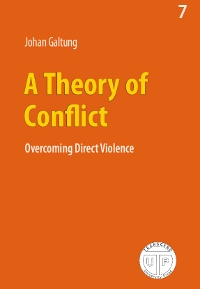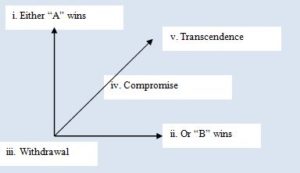Conflict Transcendence as Driving Force in History
EDITORIAL, 2 Sep 2024
#864 | Prof. Johan Galtung - TRANSCEND Media Service
 The mediation theory of TRANSCEND opens for five possibilities for simple conflicts and much more for more complex conflicts, as spelt out in A Theory of Conflict. But they are hidden in history.
The mediation theory of TRANSCEND opens for five possibilities for simple conflicts and much more for more complex conflicts, as spelt out in A Theory of Conflict. But they are hidden in history.
To transcend is to go beyond, into a new reality accommodating opposed theses, also such as the goals of actors. At a trivial level this includes a glass veranda, accommodating the wish for an unimpeded view and the wish for protection against the hazards of nature. Two reasonable, legitimate goals; both of them met with human ingenuity.[i]
We live in many such material, social and mental solutions but not trained in asking “of what conflict is this a solution?” How about the goals of states and regions, classes and nations, can conflicts be overcome without violence, from personal and social via inter-state to inter-regional? The capacity for transcending the conflict is one condition, preferably before, but also after violence.
Let us take Spain and the civil war as one example. When asking audiences in Spain “who won?” I draw a blank, which is a good answer.
The Franco-led fascist, fasces, position was social and national: social, los poderes fácticos,–landowners, military and the church– would still be in command and Spain would be una, grande, libre–one, great and free–all Spaniards; no Catalans, Basques, etc.
The Republic position was also social and national: democracy-republic, but increasingly supported only by USSR communism for arms, with an anarchism more genuinely Spanish articulated in Catalunya and Andalucia. Major national divergences within one state were pressing.
The Franco-led opposition had a clearer image of the goal, the republicans had the legitimacy. Both Nazi Germany and the Soviet Union were seen more positively those days, depressed USA-UK less so.
The nationalists won militarily in 1939 and imposed their order, gradually diluted, till Franco and that order died November 1975.
As to class: what came was a democracy with a majority favoring neither the fascist, nor the communist-anarchist options, but a general Western European social-democracy-capitalism, with different profiles where emphasis is concerned, but within that general formula.
As to nation: what came was the compromise of 17 autonomies within a unitary state; like most compromises not meeting the goals.
The successor party to Franco’s Movimiento, Partido Popular is to the right on the Neither-Nor and the compromise, but somehow in them.
Generally there are five outcomes in bilateral conflict: one prevails, the other prevails, neither one nor the other, compromise, and Both-And. Post-Franco was basically Neither-Nor. The military victor had prevailed, but with an unsustainable project. Nor did the republican option succeed. What came after 40 years was an imitation of the rest of the West, distancing Spain from the losers of the Second World War and the Cold War, but also an internal dialectic in a Spain isolated from foreign influence by boycott and censorship.
The outcome was far from what the parties had in mind, and opens for a simple hypothesis: outcomes imposed by winners will generally be inferior to Neither-Nor, compromise or Both-And. One reason is that the loser may also have valid points that are disregarded, like the social support built into the DDR structure, the economic development practice of Japan, the anti-smoking campaign of Nazi Germany. The winner may also be behind in the options of an unfolding history.
Look at democracy. Two classes were pitted against each other: clerics-aristocrats, and then le tiers etat, the bourgeoisie without pedigree. La grande revolución was structural power from high above vs.. direct revolt from more below. Who won? Arithmetic, counting, with an agonizingly slow expansion of the electorate still going on.
And the economy? Neither Smith nor Marx. Social-democracy-capitalism accommodated both; more than a compromise, but less than the fully transcending Both-And found in Japanese State-Capital and Capital-Labor cooperation. Both Smith and Marx conceived of history in dualistic terms: for Smith age-old values and sentiments of mutual aid and solidarity vs. the open competitive market, and for Marx feudalist vs. capitalist vs. socialist modes of production articulated as the aristocrat vs. the bourgeois vs. the working classes. But Smith and his followers left moral sentiments aside, betting on competitive capitalism, leading to one economic collapse after the other, to anomie and atomie, with no Both-And in sight. And Marx only thought in terms of Dualism-Manichaeism-Armageddon, DMA, the Armageddon being the revolution, with the Russian revolution imitating the French down to small details 128 years later. Marx missed Neither-Nor (local, green economies), compromise (social-democracy-capitalism) and Both-And (Japan), betting on working class-led socialism.
How can such bad theories pass unpunished? Because Western historiography is as dominated by the DMA syndrome as the Westerners they reflect in their histories, and for that reason are not only weak on counterfactual history but see history as DMA-determined, like in their own thinking. And, more importantly, they fail to see more inclusive theories of conflict outcomes, like the green, pink and yellow economies mentioned, challenging both Smith and Marx. Thus, Japan and China, not being Western, are less under the spell of Smith-Marx dualism, and develop their own Both-And formulas, now about to capture the world–probably also ultimately the Smith strongholds USA-UK (in the USA strongly buoyed by Ayn Rand–as Greenspan testified).
Thus, history as the march from one winner to the next imposing their will is bad historiography; “the winner takes all” often being inadequate. The other three may prevail, and may move history forward.
Note:
[i] For a general theory of transcending transformations see the author’s Transcend & Transform, London: PLUTO 2003; Boulder CO: Paradigm 2003; in 25 languages.
____________________________________________________
Speech delivered at the International Sociological Association – Gothenburg, Sweden, July 2010.
Originally posted on 19 Jul 2010 – #121
 Johan Galtung (24 Oct 1930 – 17 Feb 2024), a professor of peace studies, dr hc mult, was the founder of TRANSCEND International, TRANSCEND Media Service, and rector of TRANSCEND Peace University. He was nominated for the Nobel Peace Prize numerous times and was awarded among others the 1987 Right Livelihood Award, known as the Alternative NPP. Galtung has mediated in over 150 conflicts in more than 150 countries, and written more than 170 books on peace and related issues, 96 as the sole author. More than 40 have been translated to other languages, including 50 Years-100 Peace and Conflict Perspectives published by TRANSCEND University Press. His book, Transcend and Transform, was translated to 25 languages. He has published more than 1700 articles and book chapters and over 500 Editorials for TRANSCEND Media Service. More information about Prof. Galtung and all of his publications can be found at transcend.org/galtung
Johan Galtung (24 Oct 1930 – 17 Feb 2024), a professor of peace studies, dr hc mult, was the founder of TRANSCEND International, TRANSCEND Media Service, and rector of TRANSCEND Peace University. He was nominated for the Nobel Peace Prize numerous times and was awarded among others the 1987 Right Livelihood Award, known as the Alternative NPP. Galtung has mediated in over 150 conflicts in more than 150 countries, and written more than 170 books on peace and related issues, 96 as the sole author. More than 40 have been translated to other languages, including 50 Years-100 Peace and Conflict Perspectives published by TRANSCEND University Press. His book, Transcend and Transform, was translated to 25 languages. He has published more than 1700 articles and book chapters and over 500 Editorials for TRANSCEND Media Service. More information about Prof. Galtung and all of his publications can be found at transcend.org/galtung
Tags: Conflict Analysis, Conflict Mediation, Conflict Transformation, Conflict studies, Johan Galtung, Peace Studies, TRANSCEND Method
This article originally appeared on Transcend Media Service (TMS) on 2 Sep 2024.
Anticopyright: Editorials and articles originated on TMS may be freely reprinted, disseminated, translated and used as background material, provided an acknowledgement and link to the source, TMS: Conflict Transcendence as Driving Force in History, is included. Thank you.
If you enjoyed this article, please donate to TMS to join the growing list of TMS Supporters.

This work is licensed under a CC BY-NC 4.0 License.
Join the discussion!
We welcome debate and dissent, but personal — ad hominem — attacks (on authors, other users or any individual), abuse and defamatory language will not be tolerated. Nor will we tolerate attempts to deliberately disrupt discussions. We aim to maintain an inviting space to focus on intelligent interactions and debates.
